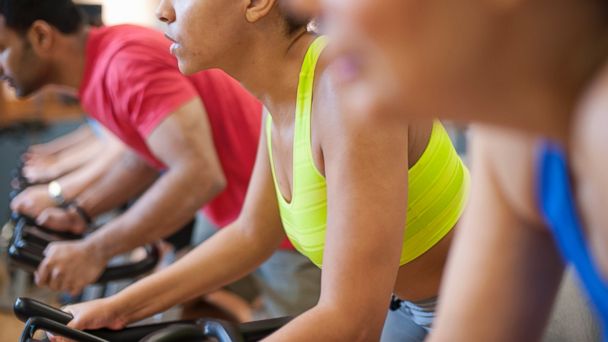We know by now that we need to work out, need to eat the right foods and do stuff that is “healthy for us,” but sometimes when we’re waking up at 5 am to hit the treadmill before work or shunning the donuts at the breakfast meeting, its easy to lose sight of what we’re doing this all for.
So here’s the quick & dirty, Mark’s Daily Apple top 10 reasons why you need and want to stay healthy. Stick this list up on your fridge, tuck it in your workout bag, heck, have it tattooed on your forehead… whatever it takes to keep you motivated to lead that healthy lifestyle!
Live Longer:

You never questioned the fact that you would need to contribute to your retirement fund at work, so why would you question an investment in your health? There is a huge body of evidence suggesting that healthy living — both in terms of exercising, eating well, and staying on top of health screenings and physicians visits — can keep you living healthy and living longer! In fact, in a recent evaluation of 20,000 people published in the Public Library of Science Medicine, it was found that people who exercise regularly, drink alcohol only in moderation, consume a nutritious diet and avoid smoking can tack an additional
14 years on to their life expectancy. Not bad, eh?
Thrive Not Just Survive:

Lets face it, living to 100 really isn’t going to matter if, at that age, you are bedridden and unable to enjoy the fruits of your labors! We need to stay healthy so that when we’re blowing out the candles at our centennial celebration, we’re able to cut a rug on the dance floor immediately after!
More Energy:

It might seem counterintuitive that when you are feeling fatigued, you should go exercise, but the reality is working out – be it a quick walk around the block, participating in a yoga class or embarking on a solitude hike – can give you the kick that you need to keep going through the day. The reason? Exercise stimulates the release of feel-good endorphins that not only make you feel better but also up your energy levels.
Avoid Disease/Illness:

In addition to keeping you looking good, regular exercise and a healthy diet can help reduce free radicals as well as promote the release of toxins associated with disease and infections. A healthy lifestyle helps stave off hypertension (high blood pressure), promote healthy cholesterol levels, reduce the risk of diabetes, and keep your ticker in shape!
Keep Medical Costs Down:

When a study came out in recent weeks suggesting that obese people are cheaper to treat than healthier weight people, the scientific community was up in arms! The
study, conducted by researchers at the National Institute for Public Health and the Environment in the Netherlands, suggested that since healthier people tend to live longer, their medical costs were higher. However, the researchers acknowledged that the cost per year was far higher for obese people than their thinner counterparts up to age 56 and that the extra cost for healthier people was associated with “life years gained.” Our verdict? It’s better to live longer and spread out all those physician visits than shun the healthy lifestyle and pass your days sitting around in the doctor’s waiting room!
For your Kids and Grandkids:

For many of us, we want to be there for all of our children’s milestones — the proms, graduations, weddings and births of your grandchildren — and for others, well, some others just want to be there so that when said grandchildren use their apple sauce to reupholster the fancy couch they can chuckle softly to themselves and let out a hearty “I told you so!”
Empowerment and Confidence:

Remember the way that you feel after completing that long run? After lifting your personal best at the gym? There you are sweaty and worn out and still feeling so darn good! And that feeling carries over and translates into the way you present yourself as well as how you are perceived by others.
Look Better:

There’s a mountain of undergarments — for both men and women — that can help you look better in your clothes, whether its padding out certain areas or sucking in others. However, when it’s you and only you filling out those jeans it just feels so much better. In addition, leading a healthy lifestyle can also improve the appearance of your skin, teeth and nails and give you that certain glow that makes you look great!
Better Mental Health:

In a
study conducted by researchers at Duke University it was found that exercising for 30 minutes, three times a week can help an estimated 60% of patients overcome their depression without using anti-depressant medications. In addition, exercise can give you the time you need to relax, take a break and deal with the problem at hand!
Better Sex:

Did you know that one of the first signs of blood pressure troubles in men is uhh… failure to stand to attention? Yep, if your body isn’t in shape, it shuns extra-curricular activities – such as sex – to protect you and allow the body time to recover. However, in a study of 600 men conducted by researchers at Boston University, it was found that a brisk
2 mile walk per day can significantly reduce the risk of erectile deficiency (ED). Healthy eating can also lead to better sex. For example, a diet rich in heart-healthy Omega-3’s (from fish, leafy green vegetables) and foods rich in L-Arginine, such as cashews, walnuts, root vegetables, garlic, ginseng, soybeans, chickpeas and seeds can help boost circulation and thus improve erectile response.
http://www.marksdailyapple.com/reasons-to-stay-healthy/#ixzz3lIuuUI6S













 \
\










